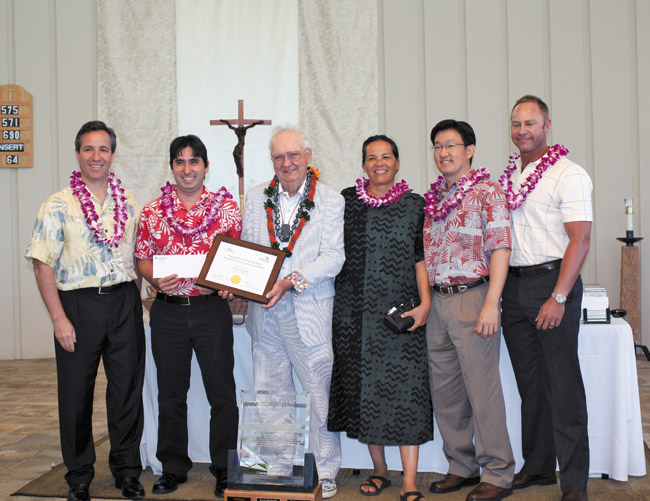Aquaponics Project Nurtures Backyard Farmers In Waimanalo

Waimanalo Aquaponics Project claimed the $12,000 first prize in the 2014 Hogan Entrepreneurs/American Savings Bank Non-Profit Business Plan competition, held recently at Chaminade University. At the presentation were (from left) ASB president and CEO Richard Wacker, Ho’oulu Pacific’s David Walfish, Ed Hogan, and Ho’oulu Pacific’s Ilima Ho-Lastimosa, Keith Sakuda and Eric Martinson. Photo courtesy of Chaminade University.
It’s one thing to grow vegetables in a backyard garden. It’s another entirely to transform that action into a community-wide industry.
But that’s exactly what Ho’oulu Pacific aims to do with its Waimanalo Aquaponics pilot project, which won top honors and $12,000 at Chaminade’s Hogan Entrepreneurs/American Savings B and Non-Profit Business Plan Competition in April.
“It meant a lot to us to be recognized locally and to be chosen as the best out of a great slate of nonprofit teams that were there, with very innovative projects,” said co-founder David Walfish, who is also vice president of Hawaii Aquaculture and Aqua-ponics Association. The team also won $25,000 as a finalist in the national Agricultural Innovation Prize at University of Wisconsin-Madison in April.
Founded two years ago by Ilima Ho-Lastimosa, Eric Martinson, Keith Sakuda and Walfish, Ho’oulu Pacific sees modern aquaponics technology imbued with very traditional meaning in Waimanalo. (The system allows nutrients in the fish tank’s wastewater to nourish the plants, which in turn cleanse the water and recycle it to the fish.)
“The backyard aquaponics system is our newfangled traditional ahupuaa system,” explained Ho-Lastimosa, a Waimanalo resident and master gardener, noting that there’s “too much stuff in the way” to nurture the old mountain-to-ocean system.
Ho’oulu Pacific believes its aquaculture system, which can grow native foods like kalo, is the best way to address today’s issues, such as diet-related obesity and diseases, rising sea levels and lack of suitable soil.
“The idea is people can grow enough in their backyard to feed their families and of course have this extra amount,” said Sakuda.
“Individually, they can’t do much with that (small surplus),” he added. “But if we’re able to get all these families to network together, we can start to generate enough that as a group it becomes a marketable commodity.”
Hoping to take advantage of the close-knit Waimanalo community, the team is now focused on the project’s second phase: selling the backyard produce. Waimanalo Market Co-op has been an early partner, and the team is making the model sustainable before it expands to other regions.
Ho’oulu Pacific also is in the process of distributing larger models of its aquaponics system that can produce 2,000 pounds of produce and fish annually.
For details, email info@hooulupacific.org.





